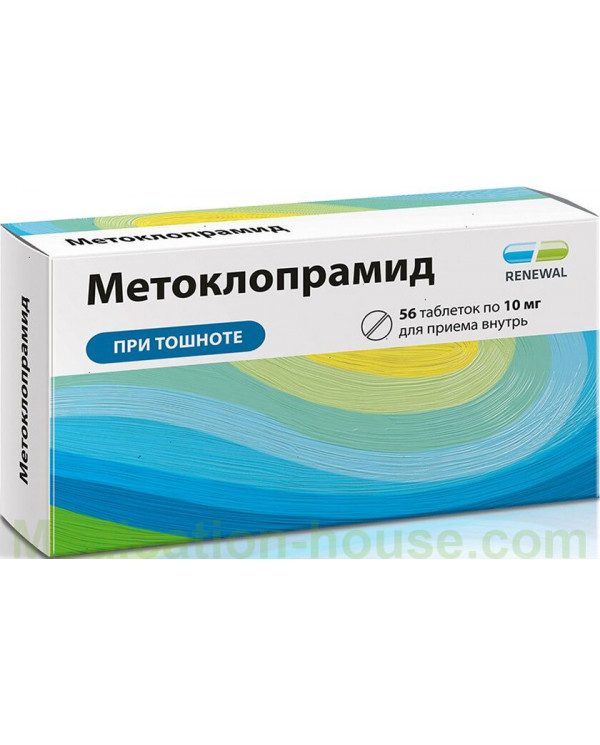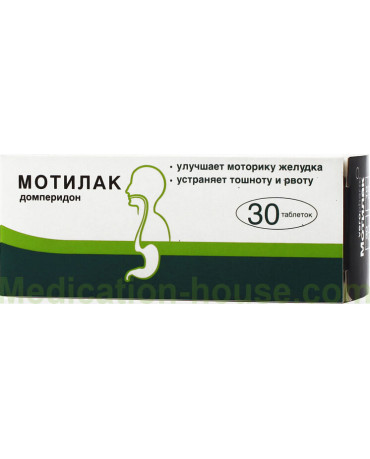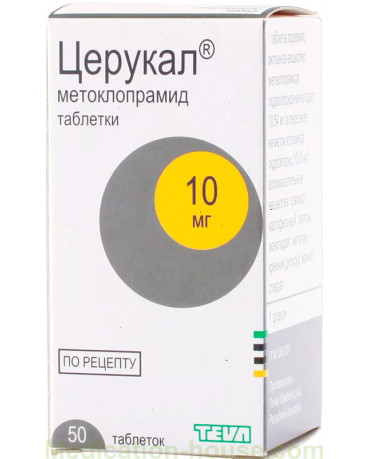Composition
Each tablet includes:
active substance - metoclopramide hydrochloride monohydrate - 10 mg (in terms of dry matter);
excipients: lactose monohydrate - 60 mg, potato starch "Extra" - 28.47 mg, enterosorbent - 0.53 mg, calcium stearate (calcium salt, chemically combined with stearic acid) - 1 mg.
Pharmacological properties
Metoclopramide acts as a substance capable of blocking serotonin and dopamine receptors.
It helps to suppress the activity of receptors in the trigger zone of the brain stem, which is responsible for the susceptibility of the body to chemical drugs (including medications). It also reduces the sensitivity of the nerves of the autonomic nervous system, transmitting impulses from the duodenum and pylorus to the vomiting center in the medulla oblongata.
The medicine has a significant effect on the hypothalamus and parasympathetic nervous system, which contributes to the activation of nerves leading to the gastrointestinal tract, as well as the regulation and coordination of the tone of its upper section.
Metoclopramide enhances the muscle activity of the stomach and intestines, activates peristalsis, prevents disruption of the lower esophageal sphincter, and reduces high acidity. The drug regulates the production of bile in an optimal amount, eliminates spasm of the sphincter of Oddi and the problems of withdrawal of bile, and does not affect the tone of the gallbladder.
The effect of metoclopramide on the gastrointestinal tract begins 10-15 minutes after an intramuscular injection and 1-3 minutes after an intravenous injection. This manifests itself in the form of increased movement of the contents of the stomach into the duodenum for further digestion, abundant discharge of fecal masses and a reduction in nausea and urge to vomit.
Metoclopramide is freely broken down in the liver and excreted in the urine within 72 hours. About 30 percent of metoclopramide hydrochloride from the total amount is excreted unchanged. The active substance easily enough penetrates the placenta and the BBB and can pass into breast milk.
It is worth remembering that because of the high ability to absorb and penetrate the placenta, the drug is able to affect the fetus.
When taking metoclopramide, it should be borne in mind that in patients with severe kidney disease, the coefficient of purification of biological fluids and tissues from the active substance of the drug is reduced by 70 percent. An increase in its half-life from plasma was also noted (approximately 15 hours with creatinine clearance of less than 10 ml / min and 10 hours with creatinine clearance of 10–50 ml / min).
With cirrhosis of the liver, the accumulation of metoclopramide is possible, associated with a decrease in the coefficient of plasma purification from it by 50 percent.
Indications
Nausea, hiccups, vomiting of various origins, while the vomiting process is undesirable (the latter is possible, for example, when taking anticancer drugs or conducting radiation therapy for malignant tumors).
Flatulence - excess flatulence in the intestines.
Functional pathological narrowing of the pylorus.
Decrease in the tone of the gastric and intestinal muscles, including those occurring as a result of an operation performed on it.
The defeat of the lower esophagus due to the ingestion of the contents of the stomach.
Hypomotor biliary dyskinesia and, as a consequence, stagnation of bile.
Exacerbation of a stomach ulcer or duodenal ulcer.
Metoclopramide is taken to activate intestinal motility, necessary before an X-ray of the digestive system, as well as to facilitate diagnostic sounding (in order to empty the stomach and promote the movement of digested food in the small intestine).
Dosage and administration
The tablets are taken orally. The dosage of the drug depends on several factors: the patient's age, diagnosis, general health status.
For adults, the drug is usually prescribed in a dose of 5-10 mg 3-4 times a day.
With severe nausea and indomitable vomiting, when taking in the form of tablets is not always possible, it is recommended to administer the drug by intramuscular or intravenous injection in a dose of 10 mg, it is also possible to instill the drug into the nose (12-20 mg in each nostril 2-3 times a day )
The maximum single dose of metoproclamide for adults is 20 mg, the maximum daily dose is 60 mg (regardless of the form of administration of the drug).
For children over 6 years of age, the drug is prescribed in a dose of 5 mg 1-3 times a day by mouth or by injection.
For children under 6 years of age, metoclopramide is administered only by injection, the daily dose is 0.5-1 mg / kg (this dose is taken 1-3 times a day, that is, completely and simultaneously, or the daily amount of the drug is divided into 2 or 3).
To suppress unwanted nausea and vomiting that are possible when taking anticancer drugs or radiation, metoclopramide is administered intravenously half an hour before the start of the procedures at a dose of 2 mg / kg body weight. If necessary, after 2-3 hours the injection can be repeated to prevent unwanted vomiting in this case, which can be caused by taking medications and medical procedures.
When an X-ray contrast study of the gastrointestinal tract is recommended, an intravenous injection of metoclopramide in a dose of 10-20 mg 15 minutes before the procedure begins.
With hepatic or renal failure, the usual dose of metoclopramide should be halved the first time you take the medicine. The subsequent dosage will be calculated by a specialist doctor, based on the patient's individual tolerance of the active substance.
Contraindications
hypersensitivity to one or more components of the drug;
gastrointestinal bleeding;
narrowing of the lumen of the pylorus (stenosis);
intestinal obstruction of a mechanical nature;
a through defect in the wall of the stomach or intestines;
glaucoma;
epilepsy (there is a serious risk of an increase in the frequency and severity of seizures);
Parkinson's disease (metoclopramide can cause an exacerbation of its symptoms);
prolactin-dependent tumors (pituitary prolactinoma, breast cancer);
children under 2 years old.
The use of metoclopramide must be limited when:
bronchial asthma due to the possibility of provoking the drug with bronchospasm;
hypertension
liver or kidney failure;
children under 14 years old;
elderly patient.
Side effects
On the part of the cardiovascular system: arrhythmia and disturbances in the movement of blood through the blood vessels.
From the side of the central nervous system: facial muscle spasm, jaw trismus, spasmodic torticollis, bulbar speech disorder, parkinsonism (in children, the risk of developing it increases when the dosage is exceeded), oculomotor muscle spasm, hypertonicity and muscle opisthotonus, dyskinesia (in case of renal failure and in elderly patients age), frequent headaches, increased anxiety, fatigue, depression, hearing impairment - tinnitus.
From the endocrine system: violations of the periodicity of the menstrual cycle and the duration of menstruation, spontaneous release of breast milk from the mammary glands, gynecomastia in men (usually due to systematic overdose of the drug).
From the digestive system: constipation, diarrhea, dry mouth (sometimes).
From the hemopoietic system: reducing the number of leukocytes per unit volume of blood, reducing the number of neutrophils per unit volume of blood, sulfa hemoglobinemia in adults.
Metabolism: porphyrin disease.
As a result of taking metoclopramide, allergic reactions are possible, including severe conditions provoked by allergies: urticaria, bronchospasm, Quincke's edema (the so-called "giant urticaria").
In the case of the manifestation of these symptoms, you should immediately contact a specialist doctor and prescribe appropriate treatment.
Use during pregnancy and lactation
Metoclopramide should not be taken by a woman in the third trimester of pregnancy, since this can lead to the development of neurological disorders in the newborn, manifested by motor disorders.
If taking the drug for objective reasons is necessary for a pregnant woman, subsequently, a newborn will need to be put on a dispensary account by a pediatric neurologist.
According to the instructions for the use of metoclopramide, the drug should not be taken by a woman during lactation, since the active substance is found in breast milk and can harm the baby. If there is an objective need for taking the drug, breastfeeding should be discontinued.
Assignment to children
According to the instructions for taking metoclopramide, the drug is prescribed to children (especially young children) with great care, since there is a risk of developing dyskinetic syndrome.
Drug interaction
enhances the effect of sedatives and sleeping pills;
enhances the effect of alcohol on the central nervous system, so combining metoclopramide with alcohol is prohibited;
increases the absorption of paracetamol, ampicillin, levodopa, tetracycline, as well as acetylsalicylic acid - this should be taken into account when taking these drugs;
contributes to the effectiveness of taking medications that lower the acidity level of gastric juice;
with the combined use of metoclopramide with cimetidine and digoxin, dose adjustment of the latter may be required.
The therapeutic effect of metoclopramide is undeniable, but it can be reduced by taking certain medications:
drugs used to treat Alzheimer's disease;
medicines with natural opiates and synthetic compounds acting on opioid receptors in the composition;
antipsychotics (especially derivatives of phenothiazines and butiformenone).
Shelf life and storage conditions
Tablets and metoclopramide injection solution are stored in a dark, dry place at a temperature not exceeding + 25 °. The drug should be protected from children.
The shelf life of the tablets is two years.
Reviews
Helena
Do you know what happens when all my life is on the run? Eating right did not always work. The result is irritable bowel syndrome + gastritis. In general, good is not enough, I went to the hospital. After systems with metoclopramide it became objectively easier. After the hospital, the continuation of treatment was prescribed already on an outpatient basis, and the same drug came in handy, but already in tablets. Now they are always in the medicine cabinet. Sometimes I take it with instructions if there is nausea.
Jana
Gastrointestinal problems are my old misfortune. How many times had to pass FGDS - do not believe it. In the end, I was lucky: I got to a good gastroenterologist. Metoclopramide was prescribed as the main drug. Of course, I was surprised when I read the instructions for metoclopramide and realized what these pills were from: an antiemetic. And I had something, but there was definitely no vomiting. Although with some disbelief, but still drank a full course of pills. Of course, there is no panacea in nature, and metoclopramide is no exception, but the problems gradually faded away. Recently, I had to drink metoclopramide and with severe nausea, as it was removed by hand. So the drug is fully used by me for its intended purpose. I can confirm that the pills work, so cheapness is not always equal to poor quality.
Terms of sell
You can buy Metoclopramide without a prescription.



